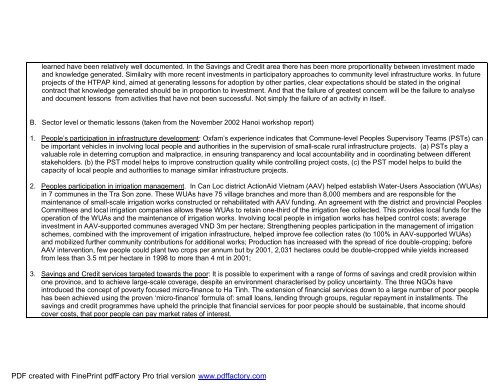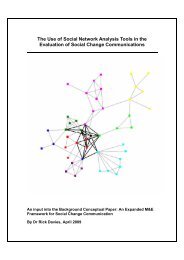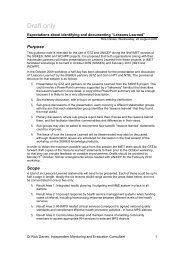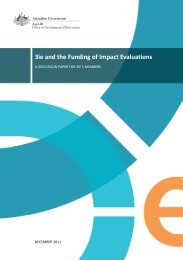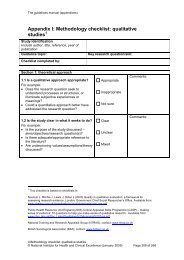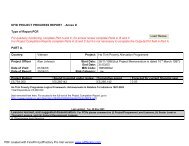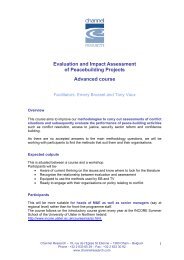DFID 2003 Ha Tinh PCR.pdf - Monitoring and Evaluation NEWS
DFID 2003 Ha Tinh PCR.pdf - Monitoring and Evaluation NEWS
DFID 2003 Ha Tinh PCR.pdf - Monitoring and Evaluation NEWS
You also want an ePaper? Increase the reach of your titles
YUMPU automatically turns print PDFs into web optimized ePapers that Google loves.
learned have been relatively well documented. In the Savings <strong>and</strong> Credit area there has been more proportionality between investment made<br />
<strong>and</strong> knowledge generated. Similalry with more recent investments in participatory approaches to community level infrastructure works. In future<br />
projects of the HTPAP kind, aimed at generating lessons for adoption by other parties, clear expectations should be stated in the original<br />
contract that knowledge generated should be in proportion to investment. And that the failure of greatest concern will be the failure to analyse<br />
<strong>and</strong> document lessons from activities that have not been successful. Not simply the failure of an activity in itself.<br />
B. Sector level or thematic lessons (taken from the November 2002 <strong>Ha</strong>noi workshop report)<br />
1. People’s participation in infrastructure development: Oxfam’s experience indicates that Commune-level Peoples Supervisory Teams (PSTs) can<br />
be important vehicles in involving local people <strong>and</strong> authorities in the supervision of small-scale rural infrastructure projects. (a) PSTs play a<br />
valuable role in deterring corruption <strong>and</strong> malpractice, in ensuring transparency <strong>and</strong> local accountability <strong>and</strong> in coordinating between different<br />
stakeholders. (b) the PST model helps to improve construction quality while controlling project costs, (c) the PST model helps to build the<br />
capacity of local people <strong>and</strong> authorities to manage similar infrastructure projects.<br />
2. Peoples participation in irrigation management. In Can Loc district ActionAid Vietnam (AAV) helped establish Water-Users Association (WUAs)<br />
in 7 communes in the Tra Son zone. These WUAs have 75 village branches <strong>and</strong> more than 8,000 members <strong>and</strong> are responsible for the<br />
maintenance of small-scale irrigation works constructed or rehabilitated with AAV funding. An agreement with the district <strong>and</strong> provincial Peoples<br />
Committees <strong>and</strong> local irrigation companies allows these WUAs to retain one-third of the irrigation fee collected. This provides local funds for the<br />
operation of the WUAs <strong>and</strong> the maintenance of irrigation works. Involving local people in irrigation works has helped control costs; average<br />
investment in AAV-supported communes averaged VND 3m per hectare; Strengthening peoples participation in the management of irrigation<br />
schemes, combined with the improvement of irrigation infrastructure, helped improve fee collection rates (to 100% in AAV-supported WUAs)<br />
<strong>and</strong> mobilized further community contributions for additional works; Production has increased with the spread of rice double-cropping; before<br />
AAV intervention, few people could plant two crops per annum but by 2001, 2,031 hectares could be double-cropped while yields increased<br />
from less than 3.5 mt per hectare in 1998 to more than 4 mt in 2001;<br />
3. Savings <strong>and</strong> Credit services targeted towards the poor: It is possible to experiment with a range of forms of savings <strong>and</strong> credit provision within<br />
one province, <strong>and</strong> to achieve large-scale coverage, despite an environment characterised by policy uncertainty. The three NGOs have<br />
introduced the concept of poverty focused micro-finance to <strong>Ha</strong> <strong>Tinh</strong>. The extension of financial services down to a large number of poor people<br />
has been achieved using the proven ‘micro-finance’ formula of: small loans, lending through groups, regular repayment in installments. The<br />
savings <strong>and</strong> credit programmes have upheld the principle that financial services for poor people should be sustainable, that income should<br />
cover costs, that poor people can pay market rates of interest.<br />
PDF created with FinePrint <strong>pdf</strong>Factory Pro trial version www.<strong>pdf</strong>factory.com


